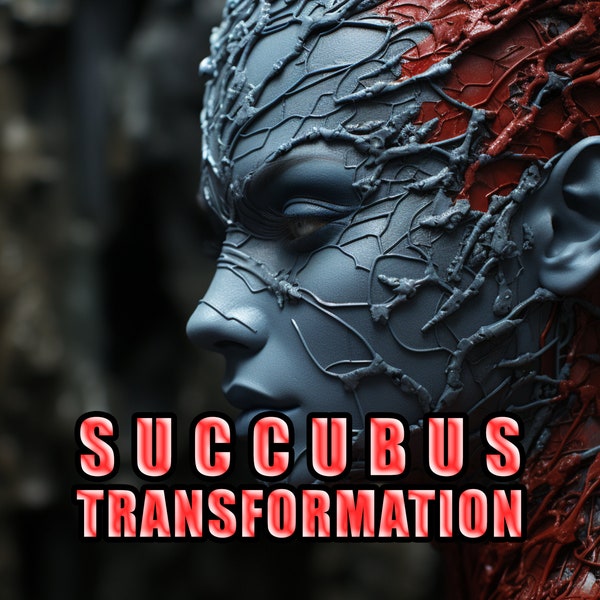Succubus transformation has long fascinated human imagination, appearing in folklore, mythology, and modern pop culture. The concept of a succubus—a supernatural entity believed to take the form of a beautiful woman to seduce men in their dreams—has evolved over centuries. This transformation from ancient myth to contemporary storytelling symbolizes humanity's complex relationship with desire, temptation, and the unknown.
The fascination with succubus transformation transcends mere fantasy. It represents deeper psychological and cultural themes, including the exploration of identity, power dynamics, and the duality of human nature. By examining this phenomenon, we gain insight into how societies throughout history have interpreted and reinterpreted these mythical creatures.
In this comprehensive article, we will delve into the origins of succubus transformation, its significance in various cultures, and its portrayal in modern media. Whether you're a mythology enthusiast, a fan of supernatural fiction, or simply curious about the allure of succubus transformation, this article aims to provide valuable insights and a deeper understanding of this captivating subject.
Read also:Barron Trump Agt Audition The Journey Performance And Impact
Table of Contents
- The Origin of Succubus Transformation
- Succubus in Mythology and Folklore
- Psychological Interpretations of Succubus Transformation
- Cultural Significance of Succubus Transformation
- Succubus Transformation in Modern Media
- Spiritual Perspectives on Succubus Transformation
- Scientific Theories Behind Succubus Transformation
- Frequently Asked Questions About Succubus Transformation
- The Impact of Succubus Transformation on Society
- Conclusion: Embracing the Mystery of Succubus Transformation
The Origin of Succubus Transformation
The concept of succubus transformation dates back thousands of years, originating in ancient Mesopotamian mythology. The earliest known references to succubi appear in the Sumerian epic of Gilgamesh, where they are depicted as supernatural beings with the power to transform and influence human desires. Over time, these myths spread to other cultures, including ancient Greece, Rome, and medieval Europe, where they evolved to reflect the values and fears of each society.
Historical Development of Succubus Mythology
As civilizations advanced, the portrayal of succubi underwent significant changes. In medieval Europe, succubi were often associated with witchcraft and demonic possession. The Malleus Maleficarum, a 15th-century text on witch-hunting, described succubi as demons who seduced men during sleep, leading to moral corruption. This perception of succubi as malevolent entities persisted for centuries, influencing religious and cultural beliefs.
Modern Reinterpretations of Succubus Transformation
In contemporary times, succubus transformation has been reimagined in a more positive light. Modern literature, films, and video games often portray succubi as misunderstood creatures seeking connection and love. This shift reflects a broader societal trend toward embracing diverse perspectives and reevaluating traditional narratives.
Succubus in Mythology and Folklore
Succubi have played a prominent role in various mythologies and folklore traditions. From ancient Mesopotamia to modern-day pop culture, these mythical beings have captivated audiences with their mysterious allure and transformative powers. Understanding the role of succubi in different cultures provides valuable insights into the human psyche and our fascination with the supernatural.
Key Characteristics of Succubi Across Cultures
- Shape-shifting abilities: Succubi are often depicted as having the power to transform into different forms, allowing them to blend seamlessly into human society.
- Charismatic charm: Their ability to seduce and manipulate through charm and beauty is a recurring theme in mythology.
- Connection to dreams: Succubi are frequently associated with nocturnal visitations, influencing dreams and altering the subconscious mind.
Psychological Interpretations of Succubus Transformation
From a psychological perspective, succubus transformation can be seen as a metaphor for human desires and fears. Carl Jung, the renowned psychologist, proposed that succubi represent the shadow—the unconscious aspects of the self that are often repressed or ignored. By exploring succubus mythology, individuals can gain a deeper understanding of their own psyche and the forces that drive their behavior.
Modern Psychology and Succubus Transformation
Contemporary psychologists have expanded on Jung's theories, suggesting that succubi symbolize the tension between societal expectations and personal desires. This duality is particularly relevant in today's world, where individuals often struggle to balance their authentic selves with external pressures.
Read also:Candidteen The Ultimate Guide To Understanding And Navigating The Teenage World
Cultural Significance of Succubus Transformation
Succubus transformation holds significant cultural importance, reflecting the values and beliefs of different societies throughout history. In many cultures, succubi serve as cautionary tales, warning against the dangers of unchecked desire and temptation. However, in others, they are celebrated as symbols of empowerment and liberation.
Cultural Variations in Succubus Mythology
- Eastern traditions: In some Asian cultures, succubi are seen as protectors rather than predators, offering guidance and wisdom to those who seek their assistance.
- Western traditions: In contrast, Western folklore often portrays succubi as malevolent beings intent on corrupting the innocent.
Succubus Transformation in Modern Media
Today, succubus transformation is a popular theme in various forms of media, including literature, film, and video games. These portrayals often emphasize the complexity of succubi, showcasing their struggles and triumphs in a rapidly changing world. By examining these representations, we can better understand the evolving nature of succubus mythology.
Notable Examples of Succubus Transformation in Pop Culture
- Books: Novels like "The Succubus Wars" series by Diana Rowland explore the challenges faced by succubi in modern society.
- Films: Movies such as "Bedevilled" and "Succubus: The Devil Within" delve into the darker aspects of succubus transformation.
- Video games: Games like "Dark Souls" and "The Witcher" feature succubi as central characters, highlighting their transformative powers and complex personalities.
Spiritual Perspectives on Succubus Transformation
From a spiritual standpoint, succubus transformation can be interpreted as a journey of self-discovery and enlightenment. Many spiritual traditions view succubi as guides who help individuals confront their deepest fears and desires, ultimately leading to personal growth and transformation.
Spiritual Practices Related to Succubus Transformation
Some spiritual practitioners engage in rituals and meditations designed to connect with succubi, seeking their wisdom and guidance. These practices often involve visualization techniques, chanting, and the use of sacred objects believed to enhance spiritual awareness.
Scientific Theories Behind Succubus Transformation
While succubus transformation is often viewed as a mythical phenomenon, some scientists have proposed explanations rooted in psychology and neuroscience. For example, sleep paralysis—a condition characterized by temporary paralysis and vivid hallucinations—has been linked to experiences of succubus encounters. This connection highlights the complex interplay between the mind and the supernatural.
Research on Sleep Paralysis and Succubus Transformation
Studies conducted by researchers at the University of Waterloo suggest that sleep paralysis may account for many reported succubus encounters. These findings underscore the importance of understanding the scientific basis behind supernatural phenomena.
Frequently Asked Questions About Succubus Transformation
Here are some common questions and answers about succubus transformation:
- What is succubus transformation? Succubus transformation refers to the process by which a succubus changes form or influences the perception of others.
- Are succubi real? While succubi are traditionally considered mythical beings, their influence on human culture and psychology is undeniable.
- How do succubi transform? In mythology, succubi use their powers of seduction and manipulation to alter reality and shape-shift into different forms.
The Impact of Succubus Transformation on Society
The enduring fascination with succubus transformation has left a lasting impact on society. From influencing artistic expression to shaping cultural norms, succubi continue to inspire and challenge our understanding of the world. By embracing the mystery of succubus transformation, we open ourselves to new possibilities and insights.
Positive Impacts of Succubus Mythology
- Creative inspiration: Succubus mythology has inspired countless works of art, literature, and music.
- Cultural diversity: The varied interpretations of succubi across cultures promote appreciation for different perspectives and traditions.
Conclusion: Embracing the Mystery of Succubus Transformation
In conclusion, succubus transformation represents a fascinating intersection of mythology, psychology, and culture. By exploring this phenomenon, we gain valuable insights into the human condition and our relationship with the supernatural. Whether viewed as mythical beings, psychological archetypes, or cultural symbols, succubi continue to captivate and inspire.
We invite you to share your thoughts and experiences in the comments below. Do you believe in succubus transformation, or do you have a favorite portrayal of succubi in media? Let us know, and don't forget to explore our other articles for more intriguing content on mythology and the supernatural.


